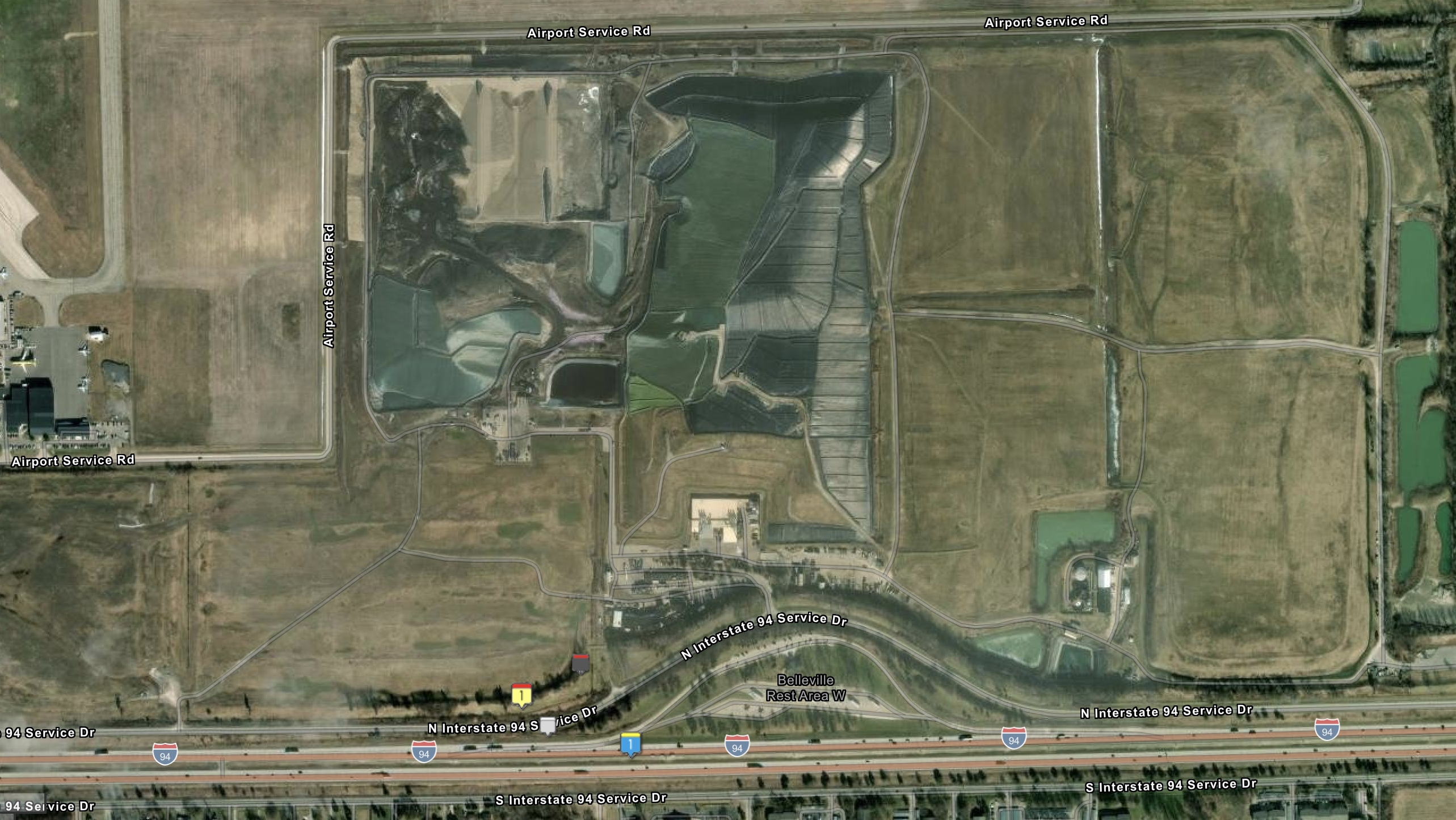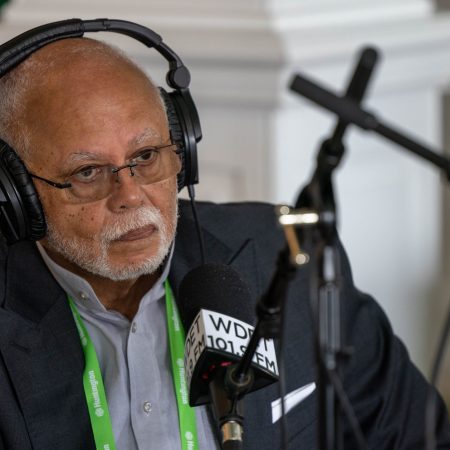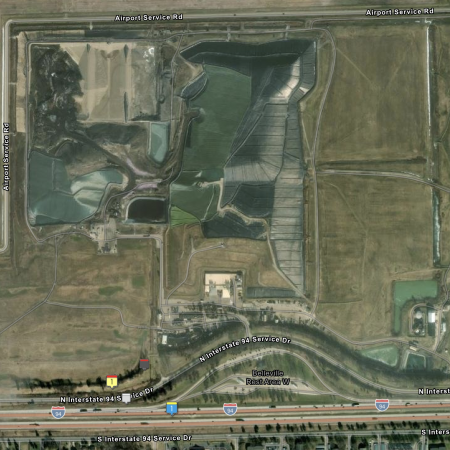Officials question why toxic atomic waste is coming to Wayne County
One of the worst parts of World War II is coming to metro Detroit this month. And it’s scheduled to keep coming into January.
Each week about 25 semi-trucks will haul low-level radioactive waste from New York to a disposal site in Wayne County’s Van Buren township.
It’s by-products from the Manhattan Project, which created the atomic bombs dropped in Japan that ended World War II.
It’s also the latest in a series of toxic material shipments sent to Michigan raising concerns among some members of Congress and other officials.
That includes Wayne County Executive Warren Evans. He says there’s a disconnect between federal agencies that regulate hazardous waste, the company that owns the Van Buren disposal site and Michigan’s government.
“It doesn’t make sense to me that we would be the location of choice so often for this toxic material.”
-Wayne County Executive Warren Evans
Listen: Warren Evans on toxic atomic waste coming to Wayne County

This interview has been edited for clarity and length.
Warren Evans: I don’t believe that they level with us about what they’re doing. My trust level for them is almost zero. And it doesn’t lead to good results or good communications back and forth. The only time we hear about these waste issues is when a reporter writes a story and we read about it and they become automatically defensive. I’m concerned about the lack of notice (that shipments are coming to Michigan.) That leads me to be concerned about the level of hazardous waste in the material and the amount that’s coming and how it’s being transported.
Quinn Klinefelter, WDET News: The Army Corps of Engineers has said they’re not required to notify anybody if they’re sending waste to a facility that’s allowed to take those kinds of shipments, which the one in Van Buren is. So when you say you don’t think that they’re leveling with you, what do you think needs to be changed?
WE: They said they’re not “required” to. What the heck does that mean? Does it mean there’s a prohibition about doing it? They’re hiding behind a rule that doesn’t require them to do it. But good public policy does require them to do it, them or somebody, I think. Hiding behind a rule that doesn’t make you do it just tells me the rule doesn’t make any sense and you’re not concerned about the reaction of the public’s health concerns about this. If that’s the way you feel, then I’m troubled by the whole thing.
QK: You’ve had a couple of town hall meetings about this and other toxic waste that came from the East Palestine, Ohio train derailment. What are you hearing from residents about the situations?
WE: It’s real clear that residents don’t want it here. And what we hear from the federal agencies is how safe they claim to be and what the rules and federal regulations are. That’s not what people are asking for. They are asking for clear answers about why so much of it is coming here and just how safe is it? It’s troubling to me, because the agencies are answering questions in a very bureaucratic way. “This is regulation 207 and we’re required to do that.” It’s double-speak to me. People are asking about the health concerns that they have, the health concerns that they’re afraid of in the future. They are asking for solid, honest answers. Part of that would be alleviated if there was more discussion about the actual hazardous waste, the toxicity of it, how it’s being transported and how it is being kept in the landfill. That would help people determine whether the safety valves are there or not there. When you hear the agencies talk about it, they say they have a stellar track record for keeping us safe. And every year you hear about catastrophes that occur and violations that occur at these different waste treatment places. Those two notions don’t square in my mind or the minds of anybody else that has any sense.
QK: So you still have some concerns when state environmental officials say that they’ve tested this latest waste coming from the Manhattan Project, that it’s within the limits that the site is permitted to take? And there’s only seven similar sites in the country, so you just gotta grit your teeth and bear with it?
WE: Yeah but that doesn’t really make sense. There’s a significant amount of it that’s coming and there’s certainly no legal prohibition against dividing it into some different landfills. Why does it all have to come here? Particularly since the waste is rated at a level that would allow it to go to many other landfills — and many other landfills that are closer to New York than here. They can talk all day about how this landfill provides added security. But if the waste is rated low enough that it can go just about anywhere, then why don’t you send it just about anywhere?
QK: I have heard that it was somewhat cheaper to dispose of it in landfills here as opposed to other places. Have you heard that same reasoning?
WE: Absolutely. And I think that that, in and of itself, calls for a state solution. It appears to me that there are two solutions that we ought to be working on as a community. One is, we ought to act legislatively, get our legislature to refuse to take it. In other words, change the rules about Michigan being able to take the hazardous waste. That’s why it’s coming out of New York, New York won’t take it. That’s one option. That’s a pretty drastic one, but a significant one. The other one is to raise the tipping fees such that it is not so profitable for those who want to deliver the waste here. I think both of those are solutions that bear some close scrutiny and, I think, support.
There are many states that are less populated than Michigan. Wayne County is the largest by population county in the state of Michigan. It doesn’t make sense to me that we would be the location of choice so often for this toxic material. Nobody wants it. There’s no financial advantage to the county for accepting it. The disadvantages are creating a further health care risk. And we’re already rated poorly in the state of Michigan in terms of health indicators.
Trusted, accurate, up-to-date.
WDET strives to make our journalism accessible to everyone. As a public media institution, we maintain our journalistic integrity through independent support from readers like you. If you value WDET as your source of news, music and conversation, please make a gift today.
The post Officials question why toxic atomic waste is coming to Wayne County appeared first on WDET 101.9 FM.

